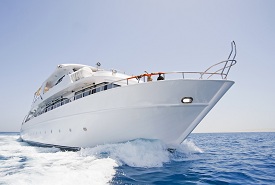 The recoverability of loss of use damages for recreational water craft has been vexing Federal courts in Admiralty cases for over 100 years. In 1897, the Supreme Court of The United States held that loss of use damages for a vessel “designed for pleasure only and which had never been put to any other use” was not a legally recognized element of damages. The Conqueror, 166 U.S. 110 (1897). The Supreme Court’s decision in The Conquerorproves the axiom that bad facts make bad law. The US Customs office had wrongfully detained one of Frederick Vanderbilt’s three yachts. Mr. Vanderbilt claimed loss of use damages of $15,000.00, a large sum of money in the 1890’s. Mr. Vanderbilt, one of the richest men in the World, produced dubious evidence concerning the loss of use of one of his many recreational diversions.
The recoverability of loss of use damages for recreational water craft has been vexing Federal courts in Admiralty cases for over 100 years. In 1897, the Supreme Court of The United States held that loss of use damages for a vessel “designed for pleasure only and which had never been put to any other use” was not a legally recognized element of damages. The Conqueror, 166 U.S. 110 (1897). The Supreme Court’s decision in The Conquerorproves the axiom that bad facts make bad law. The US Customs office had wrongfully detained one of Frederick Vanderbilt’s three yachts. Mr. Vanderbilt claimed loss of use damages of $15,000.00, a large sum of money in the 1890’s. Mr. Vanderbilt, one of the richest men in the World, produced dubious evidence concerning the loss of use of one of his many recreational diversions.
Since The Conqueror was decided in 1897, several Federal courts have questioned the reasoning behind the Supreme Court’s decision with one court going as far as calling the blanket prohibition against recovering loss of use damages “draconian”. Nordisilla v. Norfolk Shipbuilding, 192 AMC 99 (E.D.Va. 1981). Many judges have written that they would permit the recovery of loss of use damages for pleasure craft under Admiralty law but are forced not to until the Supreme Court reverses itself. Nordisilla v. Norfolk Shipbuilding, 192 AMC 99 (E.D.Va. 1981); Northern Assurance Company v. Town of Winthrop, 755 F.Supp2d 295 (D.Mass. 2010).
The lower Federal courts have not been willing lift the blanket prohibition against loss of use damages for pleasure craft in Admiralty law. However, these courts have given guidance to practitioners who decide to challenge the Supreme Court’s decision in The Conqueror. As a threshold matter, to prove loss of use, a claimant should provide reasonable proof concerning the market value of a replacement vessel during the loss period. This proof should be in the form of testimony, estimates or invoices for a bare bones charter of a replacement vessel of the same like, kind and quality. The claimant should also introduce evidence concerning the number of hours, days and weeks the vessel would actually have been used but for the accident that disabled the vessel.
While loss of use damages for pleasure craft is not recoverable under Admiralty law, loss of use for please craft is recoverable under state tort law. Martin v. Houston Hare, 337 S.E.2d 632 (N.C. App. 1985). Thus, when determining if loss of use damages are recoverable, an attorney or claims handler should determine if Federal admiralty law or state tort law applies. For the purposes of this discussion, if the accident giving rise to the claim occurred on the water admiralty law applies, but if it occurred on land, state tort law applies. For example, if a company has been hired to move a pleasure craft over dry land and drops the boat off of the trailer, state tort law applies. The claimant can recover loss of use damages the same as a claimant can recover for loss of use damages for other items, such as for loss of use of an automobile. Conversely, if the same company that was hired to haul the boat drops it into the water while unloading it, admiralty law would apply and the claimant cannot make a recovery for loss of use.





